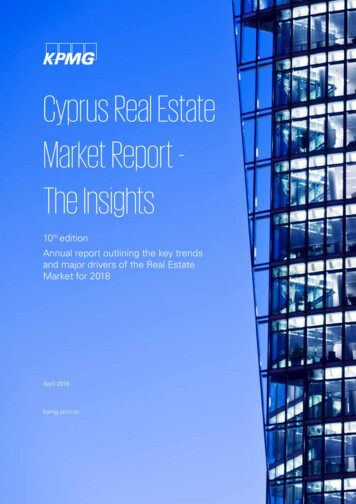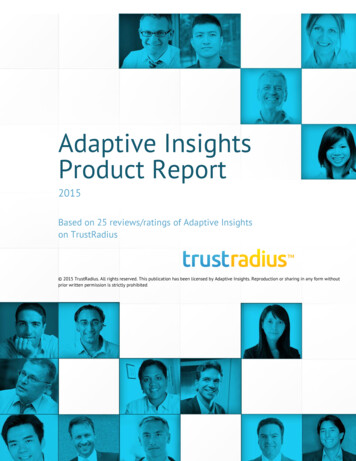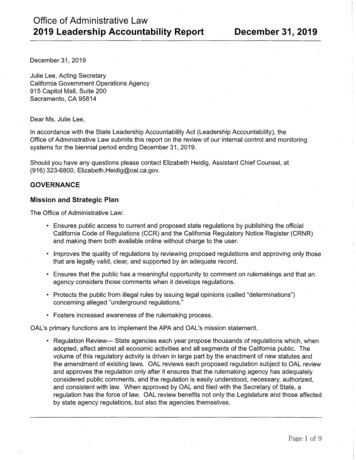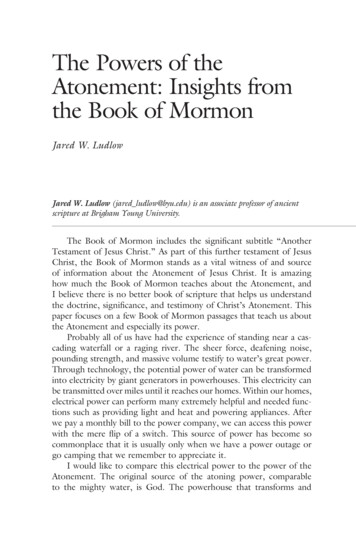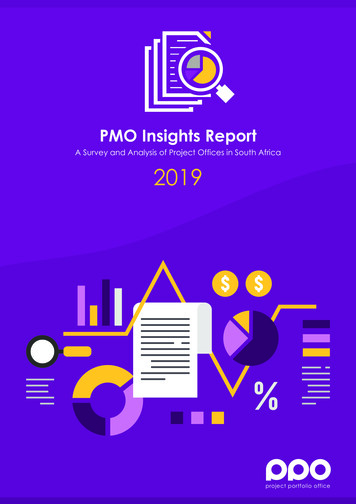
Transcription
PMO Insights ReportA Survey and Analysis of Project Offices in South Africa2019project portfolio office
Contents2Executive summary3Our data4Benchmark statistics5Executive key findings10 PMO Manager key findings17 Final thoughts18 About PPO
Executive summaryThe PMO Insights Report 2019 is the first ever comprehensive analysis of project management offices (PMOs) in South Africa, andexplores current local trends in portfolio and project management. This report lays the foundation for a regular publication aimed athelping us understand PMO trends, as well as key issues and challenges facing our community in these complex, fast-changingtimes.Project Portfolio Office (PPO) conducted the countrywide research during the period from October 2018 to May 2019 using an onlinesurvey aimed at PMO leaders and executives, PMO managers, portfolio and programme managers. The survey is methodologyneutral, and the term ‘PMO’ is being used as a catch-all for various types of project offices, from PMOs, project and programmeoffices, enterprise programme offices (EPOs) and strategy offices, to other formal and informal structures involved in the broaddiscipline of project management. Some of the key topics we examined included:Project managementoffice characteristicsEffectiveness of portfoliomanagement practicesAddressing thedisruption of AgileBenefitsrealisationThe past several years have proven to be turbulent for many organisations, characterised by an uncertain political and economicclimate. Organisations are facing increased competition both locally and globally, and in order to remain relevant, they are beingforced to adapt quicker than ever before. And, if our findings have shown anything, it is that businesses have confidence thateffective project portfolio management (PPM) practices are crucial to survival.The results of the survey reinforce the fact that C-suite executives have bought into the need for effective project and programmemanagement to drive strategic initiatives. The message being communicated by the executive is that the completion of projectsand programmes on time and on budget is expected and that there must be a broader focus on project performance. If the PMOwants to be trusted as the central organisational structure responsible for strategy execution and the realisation of organisationsuccess, it will need to sharpen its focus on benefits realisation.We are encouraged to see in our first PMO Insights Report, that despite the uncertain business climate, organisations see value inmaking the investment to improve their project management practices. That said, there is still more work to be done for PMOs tobecome a trusted strategic partner that delivers ongoing value.Summary of key findingsExecutive Only 22% of strategic projects are managed by the PMO, underlining a lack of trust for oversight of all strategic initiatives. Executives are placing more emphasis on benefits management to align projects, programmes and portfolios to strategy. 25% of PMOs are not distributing portfolio and project status reporting. Closure reporting, including benefits tracking and lessons management, is not being directed by 30% of PMOs. 50% of executives have listed resource management as one of the least value-adding functions performed by the PMO. Executives rate maturity higher than PMO leaders do, suggesting that there is a lack of understanding on the measurement oforganisational project management maturity.PMO Manager The need for a PMO has been recognised by the majority of organisations. Only 15% of PMO leaders do not receive the fundingneeded to support their PMO, and just 26% cited inadequate executive support. The adoption of Agile methodologies in organisations is on the rise, but findings suggest that Agile delivery techniques have notbeen wholly embraced. More than 50% of PMOs still need to change their budget and forecasting approach, as well as reportingand governance around Agile project delivery. 55% of PMOs stated that the compiling, consolidating and publishing of portfolio, programme and project status reports is still thesingle activity that consumes the bulk of resource time every month. While it’s encouraging to see that 56% of PMOs aim to tackle time spent on reporting by implementing or enhancing reporting,analytics, dashboard tools, only 34% aim to implement a benefits realisation process. Almost a quarter (21%) of projects are being managed by non-project managers (either within the PMO or the business itself).2
Our data161197Unique participatingorganisationsTotal responsesRespondents by sectorNGO 1%Public 21%Private 79%Large1000 zulu-Natal23%Free StateWestern Cape16%Small0-49employees14%Organisation sizeRespondents by locationRespondents by ncial Services:BankingOtherConsultingFinancial Services:InsuranceFinancial Services:OtherConstructionand 2%1%1%1%Educationand TrainingChemicalEntertainmentAgricultureMedia3
Benchmark statisticsGender49%AgeAverage active projects in the portfolio822% - Under 3028% - 30 - 4049% - 41-5020% - 50 50%1% - Not Disclosed1%Not DisclosedAverage salaryR65R85kPMO ManagersPortfolio ManagerProgramme ManagerR50R65kProject ManagerJunior Project ManagerPMO SupportR25R35kProject Co-ordinatorPMO AdministratorProject AdministratorOnly42%of PMOs have adocumentedcatalogue of servicesAverage projects completedin the last 12 months4669%of organisationshave PMOs thatare five yearsand older92%oforganisationshave a formalPMOAverage projects assignedper project manager27%of organisationshave never assessedtheir PMO’s maturitylevel22%of organisations use "guesstimates" tomeasure their maturityOnly50%of PMOs have a project managementmethodology that has been documented469% of PMOs aremanaging Agile projectsPMOs are not trusted and valued by45%of the business units they serve4
What executives are sayingSupport for the PMO from the C-suite executive level (cluster of an organisation's most important senior executives) is invaluable. Aspart of our research into the State of PMOs in South Africa, we surveyed executive leaders to capture their viewpoints, in order tohelp us understand how PMOs are perceived, and the factors driving organisational decisions and outcomes. Our research confirmsthat PMO leaders and their seniors (C-suite executives) do not view organisational success and the benefits of project managementin the same way. They have significantly contrasting views about their PMO’s performance when it comes to the measure of maturity,formulating and driving strategy, executing strategic projects, and recognising the need to improve benefits and resourcemanagement capabilities.Executives continue to be largely focused on bridging strategy formulation and execution, as well as building and sustaining basicproject management capabilities. In contrast, PMO leaders are concerned with governing the methodology and the provision oftools and templates.Executive findingsThe PMO is seen as a strategic resource but not trusted with the oversight of all strategic initiatives. Only 22%of strategic projects are managed by the PMO. Unfortunately, executives have a hard time seeing the PMOas anything other than the ‘project police’, and they've only ever experienced the PMO as a 'commandand control' function that governs projects, as opposed to delivering business outcomes.There’s a growing emphasis onbenefits management as apowerful tool to align projects,programmes, and portfolios tothe organisation’s strategy.The key process of distributingportfolio and project status reportingis not being performed by 25% ofPMOs.Strategies can not be implementedwithout effective resourcemanagement, yet 50% of executiveshave listed this in the bottom two ofthe least value-adding functionsperformed by the PMO.Executives rate maturity higher thanPMO leaders do, suggesting that thereis a lack of understanding on themeasurement of organisationalproject management maturity. SouthAfrican PMOs are relatively immature,with just over a third (35 %) at a level 3or higher.5
Positioning of the PMOOur research highlights that there is a divide between the expectations of the executive and the business level role of the PMO.According to Project Management Institute (PMI), only the enterprise PMO (typically the highest-level PMO in organisations) isresponsible for the alignment of project and programme work to corporate strategy, establishing and ensuring appropriateenterprise governance and performing portfolio management functions to achieve strategy alignment and benefits realisation. Ourfindings show that only 30% (CEO, Board/EXCO and Head of Strategy) of our PMOs are adequately positioned to drive the strategicagenda of their organisations.30%4%CEO/EXCO/Head of StrategyHead of Finance22%Head of IT22%Head ofOperations4%19%Centre ofExcellenceOtherOther: Business Performance General Manager, Head of Business Performance, Group Executive for PMO, COO, Human CapitalA key factor for the success of a PMO is how it’s positioned in the organisation. The positioning of the PMO is dependent onthe type of PMO, the services it provides and the function it performs. The PMI distinguishes between five different types ofPMOs:Business-Level RoleEnterprise PMO One for enterprise Permanent functionDivision PMO One for each division,region, or portfolio Permanent functionProject Office One per project Temporary functionProject SupportOrganisation (PSO)Normally temporary butmay have permanentfunctionProject ManagementCentre of Excellence(PMCoE)Normally permanentfunction*Source: Bolles and untabilityStrategic master planning.Tactical master planning.Project selection andprioritisation.Enterprise - reports directlyto the CEO/President.Review and approve masterproject portfolio andbudget plans. Overseeportfolios and programmes.Tactical master planning.Project-portfoliomanagement.Division, region, orportfolio - reports directlyto division manager orEnterprise PMO.Establish project-portfoliooperational and budgetplans and authoriseadjustments. Manageportfolios and overseeprogrammes.Project initiation, planning,execution, monitoring,control, and closing. Mayinclude management ofproject.Specific project - reports tothe project manager.Prepares and maintainsproject documentation asdirected by the projectmanager.Support administrativelyproject initiation, control,planning, execution,monitoring, and closing.Provide project controlsfunction.One or more specificprojects - reports tovarious project managersor a business unit manager.Report project progressand status.Establish, document, andpromulgate projectbusiness managementstandards, methodology,practices, tools, training,templates, education, andPM competency.No projects administrative functionreports to management atthe enterprise, division, orbusiness unit level asapplicable.Maintain, update, anddisseminate the projectbusiness managementmethodology, practices,tools, and projectmanagementcommunications such asstatus reports, intranetwebsite, and dashboards.Requisite Authority6
Are PMOs integrated into strategy execution?Through the research we have identified that many South African organisations acknowledge that strategic change happensthrough effective project, programme and portfolio management. 56% of executives say that the projects identified as part ofstrategic planning are managed as formal projects within their organisations, and 59% indicated that project management is thepractice to follow to drive change within your organisation.The projects identified as part of strategic planning aremanaged as formal projects within your organisation.56%33%11%Project management is the practice to follow to drivechange within your organisation.59%30%11%Strongly agreeAgreeNeutralHave our PMOs acquired the trusted partner status?Our research continues to show that the C-suite understands that embedding a project management mindset is key to improvingbusiness success, but the PMO is yet to be seen as the trusted partner essential to driving business performance. 67% of executivesindicate their PMOs are trusted and valued by the executive team and a lesser number of 55% are trusted and valued by thebusiness. If PMOs want to achieve the trusted partner status then they will have to do more to demonstrate their value.44%56%33%30%Trusted andvalued by theexecutive team4%11%Disagree11%Neither agree or disagreeAgreeTrusted andvalued by thebusiness units11%Strongly agreeMeasure of maturityUnderstanding maturity levels in the organisational contextAwarenessUnpredictable andreactive. Work getscompleted but is oftendelayed and overbudget.Managed on theproject level. Projectsare planned,performed, measuredand controlled.52%Proactive, rather thanreactive.Organisation-widestandards provideguidance acrossprojects, programmesand portfolios.46%Executives26%19%20%4%LEVEL 1LEVEL 2LEVEL 3Stable and flexible.Organisation is focused oncontinuous improvementand is built to respond toopportunity and change.The organisation's stabilityprovides a platform foragility and innovation.Measured and controlled.Organisation is data-drivenwith quantitativeperformance improvementobjectives that arepredictable and align tomeet the needs of internaland external stakeholders.15% 14%LEVEL 4PMO managers4%1%LEVEL 5In its simplest definition, project management maturity is an indication of the ability of an organisation to master its project deliverycapability. It enables the PMO to assess its project management processes with the aim of making noticeable and constantimprovements. An organisation may not need the highest level of maturity, and the type of projects and the needs of theorganisation will dictate the optimal maturity level. The research data shows that the C-sui
The results of the survey reinforce the fact that C-suite executives have bought into the need for effective project . Average salary PMO Managers Portfolio Manager Programme Manager PMO Support Project Administrator PMO Administrator Project Co-ordinator Junior Project Manager Project Manager R65-R85k R50-R65k R25-R35k of organisations have PMOs that are five years and older 69% of .

